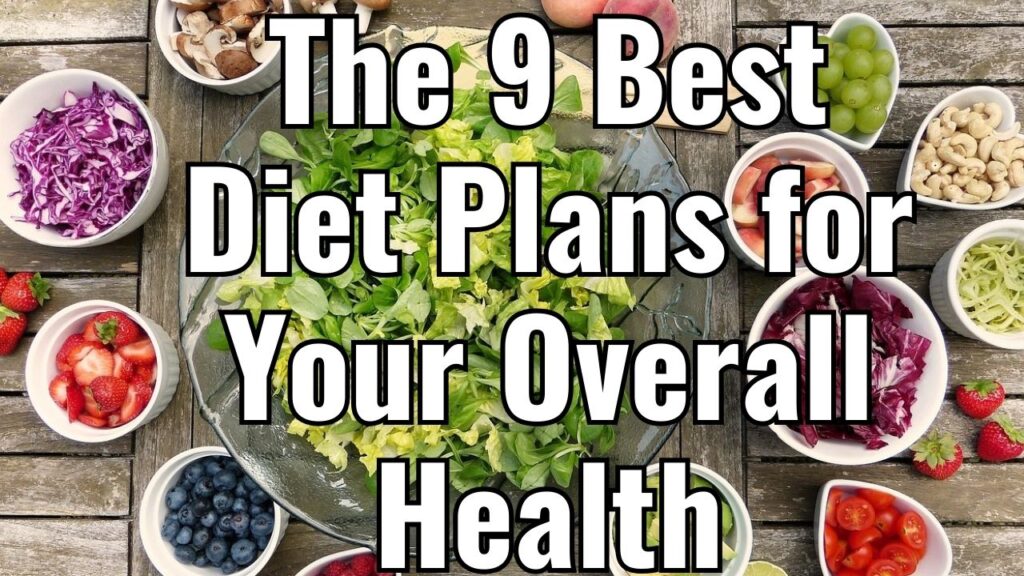A healthy diet is essential for maintaining overall health and well-being. While many diets focus solely on weight loss, some are designed to provide additional health benefits. These diets can improve various aspects of your health, such as reducing the risk of chronic diseases, improving heart health, and promoting mental well-being.
In this article, we will explore the nine best diet plans for your overall health. Each of these diets offers unique benefits and can be tailored to suit your individual needs and preferences.
Advertisement
1. The Mediterranean Diet
The Mediterranean diet is often considered the gold standard for nutrition and overall health. It is based on the traditional eating patterns of people in countries like Italy and Greece.
Advertisement
The Mediterranean diet emphasizes consuming a variety of whole foods, including fruits, vegetables, whole grains, legumes, nuts, and seeds. It also encourages the consumption of fish and poultry in moderation, while limiting red meat, processed foods, and added sugars.
Research has shown that the Mediterranean diet is associated with a reduced risk of chronic diseases, such as heart disease, type 2 diabetes, and certain types of cancer. It is also known to promote weight loss and improve overall well-being.
Advertisement
To follow the Mediterranean diet, incorporate more fruits, vegetables, whole grains, and healthy fats into your meals. Opt for olive oil as your primary source of fat and limit your intake of processed and sugary foods.
2. The DASH Diet
The Dietary Approaches to Stop Hypertension (DASH) diet was originally developed to help lower high blood pressure. It focuses on consuming foods that are low in sodium and high in nutrients.
The DASH diet encourages the consumption of fruits, vegetables, whole grains, lean proteins, and low-fat dairy products. It also recommends reducing the intake of sodium, saturated fats, and added sugars.
Studies have shown that the DASH diet can help lower blood pressure and reduce the risk of heart disease, stroke, and other chronic conditions. It is also effective for weight loss and improving overall health.
To follow the DASH diet, aim to consume more fruits, vegetables, whole grains, and lean proteins. Limit your intake of sodium, saturated fats, and added sugars. Incorporate more physical activity into your daily routine for optimal results.
3. Plant-Based and Flexitarian Diets
Plant-based diets, such as vegetarianism and veganism, have gained popularity in recent years. These diets focus on consuming plant foods while limiting or eliminating animal products.
Vegetarian diets exclude meat but may include dairy products and eggs. Vegan diets, on the other hand, exclude all animal products, including dairy, eggs, and honey. Flexitarian diets are more flexible and allow for occasional consumption of meat and animal products.
Plant-based diets have been associated with numerous health benefits, including a reduced risk of heart disease, certain types of cancer, and obesity. They are also more environmentally sustainable and promote ethical considerations.
To follow a plant-based diet, focus on consuming a variety of fruits, vegetables, whole grains, legumes, nuts, and seeds. Ensure that you are meeting your nutritional needs by incorporating sources of protein, iron, calcium, and vitamin B12 from plant-based sources or fortified products.
4. The MIND Diet
The MIND diet combines aspects of the Mediterranean and DASH diets to create an eating plan that promotes brain health. MIND stands for Mediterranean-DASH Intervention for Neurodegenerative Delay.
This diet emphasizes consuming foods that are beneficial for brain health, such as green leafy vegetables, berries, nuts, whole grains, fish, and olive oil. It also recommends limiting the intake of red meat, butter, cheese, pastries, and fried or fast food.
Research has shown that following the MIND diet can reduce the risk of Alzheimer’s disease and cognitive decline. It may also improve overall brain function and protect against age-related neurodegenerative diseases.
To follow the MIND diet, incorporate more brain-healthy foods into your meals, such as leafy greens, berries, nuts, and whole grains. Limit your intake of processed and unhealthy foods, and focus on maintaining a balanced and nutritious diet.
5. WW (formerly Weight Watchers)
WW, formerly known as Weight Watchers, is a popular weight loss program that focuses on improving overall health and well-being. It uses a points-based system to help individuals make healthier food choices and manage their weight.
The WW program assigns different foods and beverages a value based on their calorie, fat, and fiber contents. Users are given a daily point allowance and encouraged to stay within their limits while making nutritious food choices.
Studies have shown that the WW program can be effective for weight loss and long-term weight management. It promotes a balanced and flexible approach to eating, allowing individuals to enjoy a wide variety of foods while still achieving their weight loss goals.
To follow the WW program, track your daily food intake using the points system. Make healthier food choices, prioritize fruits, vegetables, lean proteins, and whole grains, and incorporate physical activity into your daily routine.
6. Intermittent Fasting
Intermittent fasting is a dietary strategy that involves cycling between periods of fasting and eating. There are several different methods of intermittent fasting, including the 16/8 method and the 5:2 method.
The 16/8 method involves restricting your calorie intake to an 8-hour window and fasting for the remaining 16 hours of the day. The 5:2 method involves eating normally for 5 days of the week and restricting calorie intake to 500-600 calories for the remaining 2 days.
Intermittent fasting has been shown to have numerous health benefits, including weight loss, improved insulin sensitivity, reduced inflammation, and increased autophagy (cellular repair process). It may also help lower the risk of chronic diseases and improve brain health.
To practice intermittent fasting, choose a fasting method that suits your lifestyle and preferences. Ensure that you are consuming a balanced diet during your eating windows and staying hydrated throughout the day.
7. The Volumetrics Diet
The Volumetrics diet focuses on consuming high-volume, low-calorie foods to promote weight loss and overall health. It emphasizes the consumption of foods that are low in calorie density but high in nutrients.
The Volumetrics diet categorizes foods based on their calorie density, with category one foods being very low in calorie density and category four foods being high in calorie density. The diet encourages consuming more category one and two foods while limiting category three and four foods.
Research has shown that the Volumetrics diet can be effective for weight loss and improving overall diet quality. By focusing on consuming nutrient-dense foods, individuals can feel satisfied while reducing their calorie intake.
To follow the Volumetrics diet, prioritize foods that are low in calorie density, such as fruits, vegetables, whole grains, and lean proteins. Limit your intake of high-calorie density foods, such as processed snacks and sweets.
8. Low Carb Diets
Low carb diets, such as the Atkins diet, ketogenic (keto) diet, and low carb, high fat (LCHF) diet, have gained popularity for their ability to promote weight loss and improve overall health.
These diets focus on reducing carbohydrate intake and increasing consumption of protein and healthy fats. By restricting carbs, the body enters a state of ketosis, where it burns fat for fuel instead of carbohydrates.
Research has shown that low carb diets can be effective for weight loss and may improve markers of heart health, such as blood pressure and cholesterol levels. They can also help regulate blood sugar levels and reduce the risk of type 2 diabetes.
To follow a low carb diet, limit your intake of high-carb foods, such as bread, pasta, and sugary snacks. Instead, focus on consuming protein-rich foods, healthy fats, and non-starchy vegetables.
9. The Mayo Clinic Diet
The Mayo Clinic Diet is a lifestyle program developed by the reputable medical organization to promote healthy eating and weight management. It focuses on making long-term changes to improve overall health and well-being.
The Mayo Clinic Diet uses a pyramid to illustrate the quantities of different foods that should be consumed. It emphasizes fruits, vegetables, whole grains, lean proteins, and healthy fats. Regular physical activity is also encouraged.
While there is limited research specifically on the Mayo Clinic Diet, it is designed to promote weight loss and improve overall health. By making sustainable changes to your eating habits and engaging in regular exercise, you can achieve long-term weight management and better health.
To follow the Mayo Clinic Diet, incorporate more fruits, vegetables, whole grains, and lean proteins into your meals. Limit your intake of processed foods, sugary snacks, and unhealthy fats. Engage in regular physical activity to support your weight loss and overall well-being.
In conclusion, there are various diet plans available that can improve your overall health and well-being. These diets focus on consuming nutrient-dense foods, promoting weight loss, and reducing the risk of chronic diseases. Choose a diet plan that suits your individual needs and preferences, and consult with a healthcare professional before making any significant dietary changes. Remember that a healthy diet should be balanced, sustainable, and enjoyable.

